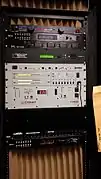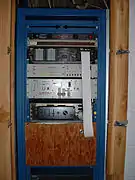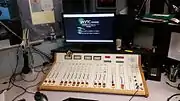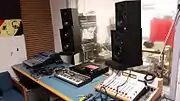WVTC
WVTC is the radio station of Vermont Technical College, operating on a 90.7 MHz FM carrier with an effective power of 300 watts. The station is located in Morey Hall on the Randolph Center campus. WVTC is operated and maintained by the students of VTC through the Radio Club, and is financially supported by VTC Student Council.
 | |
| City | Randolph Center |
|---|---|
| Broadcast area | Vermont Technical College |
| Frequency | 90.7 Mhz |
| Branding | Tech Radio |
| Slogan | "Setting the air on fire!" |
| Programming | |
| Format | College Radio |
| Ownership | |
| Owner | Vermont State Colleges |
| History | |
First air date | 1961 |
Call sign meaning | Vermont Technical College |
| Technical information | |
| Facility ID | 69957 |
| Class | A |
| ERP | 300 watts |
| HAAT | 64.0 meters |
Transmitter coordinates | 43.9387° N, 72.6047° W |
| Links | |
| Webcast | Webcast |
| Website | Official website |
History
WVTC began in 1963 as a small AM station on 640 kHz with a 2-watt transmitter in the Old Dorm building. It is unclear how the antenna system worked; there is speculation that it may have been a carrier current system. The 1965 VTC yearbook distinguished between the Radio Club and the Radio Station WVTC-AM 640. In 1966 a new dorm building, Morey Hall, was built on the Randolph Center campus, including provisions for a campus radio station, and the radio station moved into its new home at Morey Hall the following year. In 1968 the radio station received a license from the FCC to broadcast as WVTC-FM at 90.7 MHz and 10 watts.
The station prospered during the 1970s, with the involvement of Howard Ginsberg, who later founded WXXX, a successful commercial Top 40 station in Burlington, Vermont. In the 1980s, the station was granted a 300-watt license.
In the 1990s, WVTC migrated to CD technology. From April to November 1995 the station was off the air due to a failed EBS receiver and other potential violations. Many upgrades were performed the following year, including new studio and broadcasting equipment. The station experimented with station automation, using multi-CD changers, controlled via serial connection. A new transmitter was installed and the tower erected on December 26, 1996.
The station began internet webcasting in February 1997, streaming both music and webcam images, the first on-line radio streaming station in Northern New England, sending a copy of on-air audio over MP3 format at 16kbit/s using custom software on a Pentium 60. MP3s were introduced as an on-air medium the same year. The first mp3 played on the station was "Stupid Girl" by Garbage.
In 1998 the WebDJ automation system went live and SCA technology was explored, with data being sent about weather and news events. The same year WVTC broadcast 24/7 for the first time, and ranked in the broadcast ratings for Central Vermont. Technological innovations of 1998 included an upgrade to a 32kbit/s stream using a computer club purchased Linux server with two processors called "Halftime", as well as the creation of a remote control interface for the Winamp application. Station staff created an improved FM radio card driver to Linux and were added to the Linux Kernel.
In March 2000, DJ "Disco" Vince Giffin set a world record for the longest time for a single DJ on the air, at 73 hours. In 2001 MP3 music replaced CDs as the station's primary audio storage format. In 2006 the station's survival was jeopardised by low membership, and went off the air due to transmitter problems during the summer, returning after repairs in the fall. The following Spring a small group of students banded together to prevent the school administration from shutting down WVTC. Some hardware and software upgrades were performed in the spring and a couple of regular shows were broadcast.
In Fall 2007 the station was forced to shut down when their FCC license failed to be renewed by the college. Shortly afterwards, the college was approached by Vermont Public Radio with proposals to lease the station, which was not accepted. The station resumed transmission in Fall 2008, but went offline again before the end of the year after repeated power failures damaged their equipment. The equipment was eventually replaced, and transmission resumed in Fall 2009.
In Spring 2011 the station filed a Consent Decree with the FCC, and returned to being a fully licensed station after a Final Consent Decree Inspection in Fall 2013. In Fall 2015 the internet stream was upgraded to 320kpbs.
Gallery
 Current equipment in 2016.
Current equipment in 2016. Pre-2012 equipment in the station.
Pre-2012 equipment in the station. The set up for live shows
The set up for live shows The main board all the equipment is run through
The main board all the equipment is run through The current set up in the production room of the station
The current set up in the production room of the station
External links
- WVTC website
- WVTC in the FCC's FM station database
- WVTC on Radio-Locator
- WVTC in Nielsen Audio's FM station database